Speaking to the more hard-hearted readers for one moment: I know Kay Francis is generally associated with films usually referred to as anything from weepies to women’s pictures. And yes, One Way Passage certainly falls under whichever tearjerker type label you might put on many of her other pictures. But please, trust me, one of your own, on this one–you’re going to want to check out One Way Passage!
While Francis’ fade seems more popularly remembered today One Way Passage comes at the peak time of her career. Warners definitely put her in some stinkers later on with hopes of driving her, and especially her enormous paycheck, away from the studio. But One Way Passage comes soon after she, as well as co-star William Powell among others, jumped studios during Warner Brothers infamous raid of Paramount talent.
Kay Francis was a star on the rise at that time and One Way Passage would come sandwiched between two other gems, Jewel Robbery (1932), also with Powell, and her best known film, Ernst Lubitsch’s masterpiece Trouble in Paradise (1932). One Way Passage, Francis and Powell’s sixth and final pairing, is better remembered than the former but it’s reputation pales in comparison to the latter. Not so starkly though if you’re among those who’ve seen it.
One Way Passage is a thrilling little 67 minute film from Warner Brothers that tells the story of an intense shipboard romance on the march towards death for a doomed woman and a condemned man.
Joan (Kay Francis) is very sick. Her specific ailment is never discussed but it’s made clear that she’s quite weak and death is imminent. Dan (William Powell) is a convicted murderer being escorted to the gallows by police Sergeant Steve Burke (Warren Hymer).
This isn’t giving anything away unless you’re Joan or Dan. You see neither of them is aware of the others’ predicament, but we’re let in on this almost from the get-go.
It’s love at first sight for Joan and Dan as she bumps into him in a Hong Kong bar causing Dan to spill his freshly made Paradise Cocktail. Annoyed Dan turns to scold her but their eyes immediately lock and they’re lost in each other for the rest of the film. They toast, drink–Joan remarks, “Always the most precious. The last few drops,” about what remains, not only of Dan’s spilled drink–then break their glasses and cross the stems before Dan departs. They leave luck as their only hope for seeing each other again.
Dan, in fact, would need to be especially lucky. Exiting the bar a final gaze into Joan’s eyes is interrupted when a gun is jammed into his back. He slowly raise his arms. It’s Burke, or as the actor playing him, Warren Hymer, says it: Boike, who’s caught up with Dan after having previously lost him in Berlin. Dan throws a punch that Burke takes well enough to immediately counter, momentarily knocking out Dan and giving him an opportunity to handcuff Dan to his own wrist.
As Burke escorts Dan away they bump into Skippy, a small time crook played by Frank McHugh. I recently shortchanged McHugh in my recent article about Stage Struck for no other reason than there being other things I wanted to talk about there. I want to go out of my way this time though to say that beyond what shows up once in awhile as a bit of an overzealous makeup job, McHugh is at his tip-top best in One Way Passage. His Skippy is loaded on booze throughout the movie and punctuates seemingly every bit of his often hilarious dialogue with his famed laugh at the end–ha ha ha. He’s given several scenes to pick pockets and steal liquor with his funniest bit coming during in a run-in with himself in a mirror. That old gag that could have fallen flat but not with McHugh who pulls off Skippy so well that you believe that’s who he is.
Standing on deck of the ship cuffed to Burke, Dan talks the lawman into showing him the key to the handcuffs and further revealing to Dan that he can’t swim. Unbolting the railing Dan pulls Burke overboard with him to the sea below.
An interesting thing about Powell’s Dan. Yes, we know he’s a murderer, but hey, this is Hollywood, we can assume it was a mistake or the other guy had it coming. In fact Skippy says at one point that Dan’s crime was “croaking the dirtiest heel who ever lived.” Powell as Dan is every bit the suave William Powell who soon grows towards legendary status beginning with his lead in The Thin Man at MGM in 1934. He’s well-spoken, nattily attired, polite and classy, just the way we like him.
But once Powell’s Dan hits the water with the startled Burke he manages to unlock the handcuffs, then, rather than swimming immediately for shore, he dunks Burke underwater and holds him there. Possessed with the knowledge that Burke can’t swim I really believed Dan, our hero, was going to commit a rather cold-blooded murder right before our eyes. But cries of “Man overboard” from above cause Dan to lift Burke’s head out of the drink and swim him back to the boat. Meeting eyes with Joan once more seals the deal. Dan’s going to ride this one out.
All of our characters are now on board the ship as it prepares to leave dock. Even Skippy, who hastily avoids the Hong Kong authorities by running up the gangplank and leaping onto the ship as it’s pulling away. And we pretty much stay entirely on the ship barring a brief stopover in Honolulu. That stopover, by the way, ends with Skippy hastily avoiding the Honolulu authorities by running up the gangplank and leaping onto the ship as it’s pulling away–ha ha ha.
Since Burke wasn’t aware of Dan having caused their spill, Dan has at least succeeded in earning a small degree of trust from his captor. Once the boat departs Burke allows Dan to wander the ship free of his shadow. Burke initially intends to at least keep a close eye on Dan. That is his job after all and bringing a fugitive murderer to justice would surely be quite the coup professionally. But Burke is soon distracted when he becomes smitten by the exotic, in both dress and accent, Countess Barilhaus.
But wait a minute. The Countess, played by Aline MacMahon, has a brief moment of eye contact with Dan as she walks by. That seems odd. But then Skippy rushes over to the Countess and nearly spills her cover. In her next scene the “Countess” is sharing a bottle with Skippy, and reminiscing over old times in her natural voice. The “Countess Barilhaus,” or Barrel House Betty as she’s better known, is another shipboard hustler. But those days are about over for Betty, who’s simply looking to settle down with a man with means enough to afford her the security of a nice chicken ranch.
The rest of the cruise covers the escalation of Dan and Joan’s relationship with Skippy and Betty running interference on Burke as best they can. In Dan, Skippy, Betty, and even Burke, we’re actually warming up to people who’ve done some pretty vile things, but Dan and Joan’s love for one another proves so passionate that they’re all overwhelmed to some degree. And I guess we are too.
One Way Passage centers around the Dan and Joan’s passion for one another, and that alone would be enough. It works. William Powell and Kay Francis really appear consumed with one another throughout, perhaps no more so than that first meeting in Hong Kong where Francis appears barely able to restrain herself from attacking Powell.
But there’s more than that happening here even if a lot of it takes a distant back seat.
I’ve already mentioned that McHugh is sterling so let me add that MacMahon is wonderful as well. Warren Hymer, who’s still getting strong parts at this point, is at his best. While he’s pretty much his usual one-note tough guy, there’s more of him in One Way Passage than I’m accustomed to seeing and his shtick really works here. I’m now convinced no one can say sucker quite like Warren Hymer.
One Way Passage includes one of those great pre-code scenes that would be impossible just a couple of years later. Skippy meets up with Betty in her cabin and she gives him the bullets out of Burke’s gun which should clear a path for Dan once the boat docks. Skippy wonders how Betty got close enough to get a hold of Burke’s weapon. Betty’s reply is in her eyes and a jerk of her head which the camera follows to reveal Burke’s tie laid across a chair. She then shushes Skippy leaving no doubt that not only did she seduce Burke to get to his gun, but that he’s still in her bed.
There’s something more slowly sprouting from this con between the MacMahon and Hymer characters, leaving McHugh as one of the funnest fifth wheels you’re going to come across. One Way Passage would have taken on a much more serious overall tone if his scenes weren’t peppered in throughout, always seemingly right in the perfect place to break the different types of tension between Powell and Hymer as much as Powell and Francis.
The dialogue is fantastic throughout, great period lingo delivered fluently by all. There are a few suspenseful scenes as well, especially between Powell and Hymer’s characters as Powell’s Dan wriggles towards freedom best he can while Hymer’s Burke does all he can to keep him in his place.
One Way Passage was directed by Tay Garnett, best known for his later classic The Postman Always Rings Twice (1946). In One Way Passage he gets exceptional work out of Francis, and, no surprise, McHugh and MacMahon. Powell is typically polished, but much more the lover than we see him in work coming after this. He’s very at ease around Francis, as he would be, the pair having worked together so many times before.
There are exceptionally shot scenes throughout including the opening Hong Kong bar scene; Powell and Hymer’s confrontation before making land in Honolulu; and the Powell-Francis Honolulu love scene.
Another quick 67 minutes from Warner Brothers, One Way Passage has a little bit for everyone tucked somewhere on board. If William Powell and Kay Francis can’t warm you up a little, well then, Frank McHugh is worth the price of admission all on his own.
One Way Passage is available for purchase as a Made to Order DVD from Warner Archives. It’s airing on TCM in the wee hours on December 16 at 3:30 am EST (late night, Dec. 15) as Turner Classic Movies celebrates William Powell as its Star of the Month throughout December 2011.
[phpbay]William Powell|Kay Francis, 12, “45100”, “”, “”, “”, 39[/phpbay]



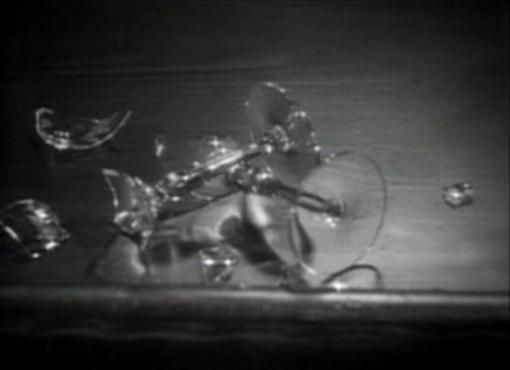

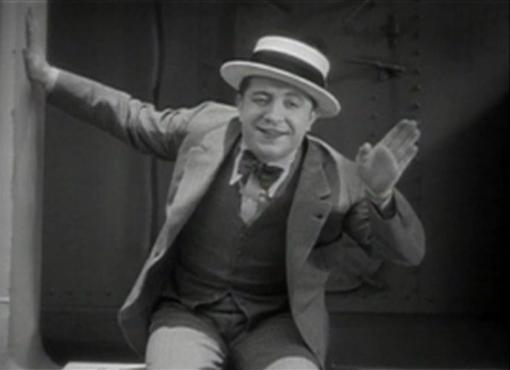
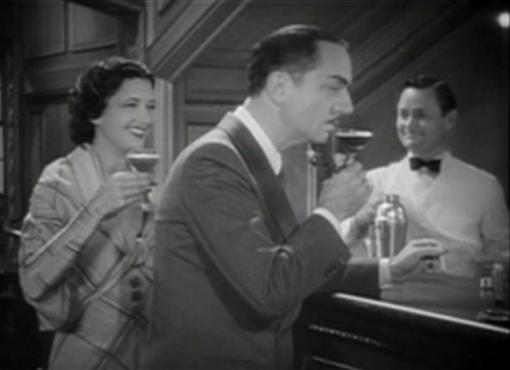

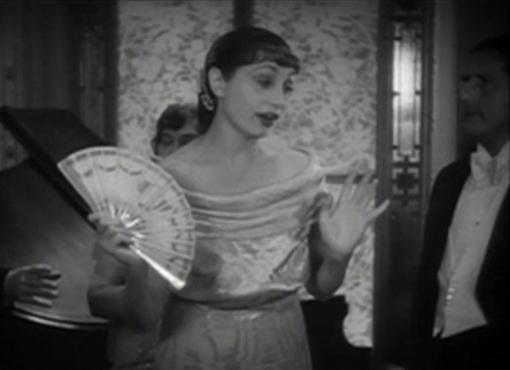
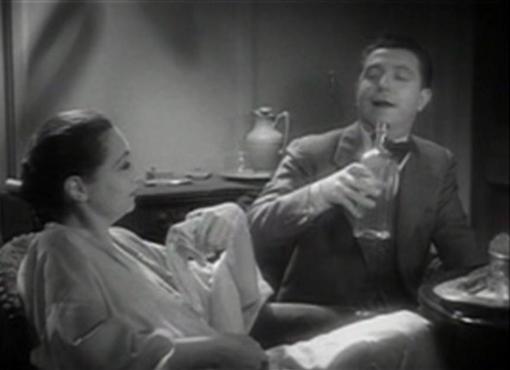
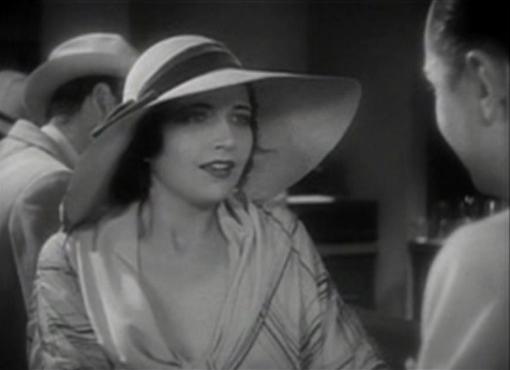




This one sounds great! I’m not a huge Kay Francis fan but have always enjoyed the films she’s appeared in. Great review once again. These shorter films, of an hour or just over an hour and from the 1930s are so great rainy day weekend watches for me!
@twitter-21906345:disqus if you’ve got even a tiny bit of romance in your heart you’ll love it! I’m hoping to sell it to my fellow cynics here. It’s got more recognition than a lot of movies from this period, but it deserves an even wider audience. Definitely recommended for you to queue up in Classicflix–enjoy!
A scant 8 years later when the story would be remade (serviceably, if not exceptionally) as “Til We Meet Again”, Warners would get McHugh to reprise his supporting role. He was just that kind of guy.
The image of those broken glasses never leaves you.
@e324244fad5772057df7f8469751b626:disqus I knew of the remake, but have never seen it nor followed up on it, so that’s news to me about Frank McHugh. Now I might have to chase it down!
Hi Cliff, I posted to you over on the Stage Struck page a day or two ago looking for the clip of Yacht Club Boys —–I had looked all over the net under their name and “the Income Tax” which several places referred to the song as. —-No mention of it as “The Government Takes Away.” —–Just wanted to say thanks! —–And when I pass it on over the next few weeks, I’ll be sure to card it with your name and site as expert and source-dealer of all things movies of a certain era!
Best Wishes and Success to You!
-Jay
Thanks, @ba1e344d6f071e99665ca473bbf0b7b4:disqus glad I could help out. Thanks for the good wishes!